Thomas James Richards, Diaries, Transcript Vol. 3, 26 January to 8 November 1916 - Part 10
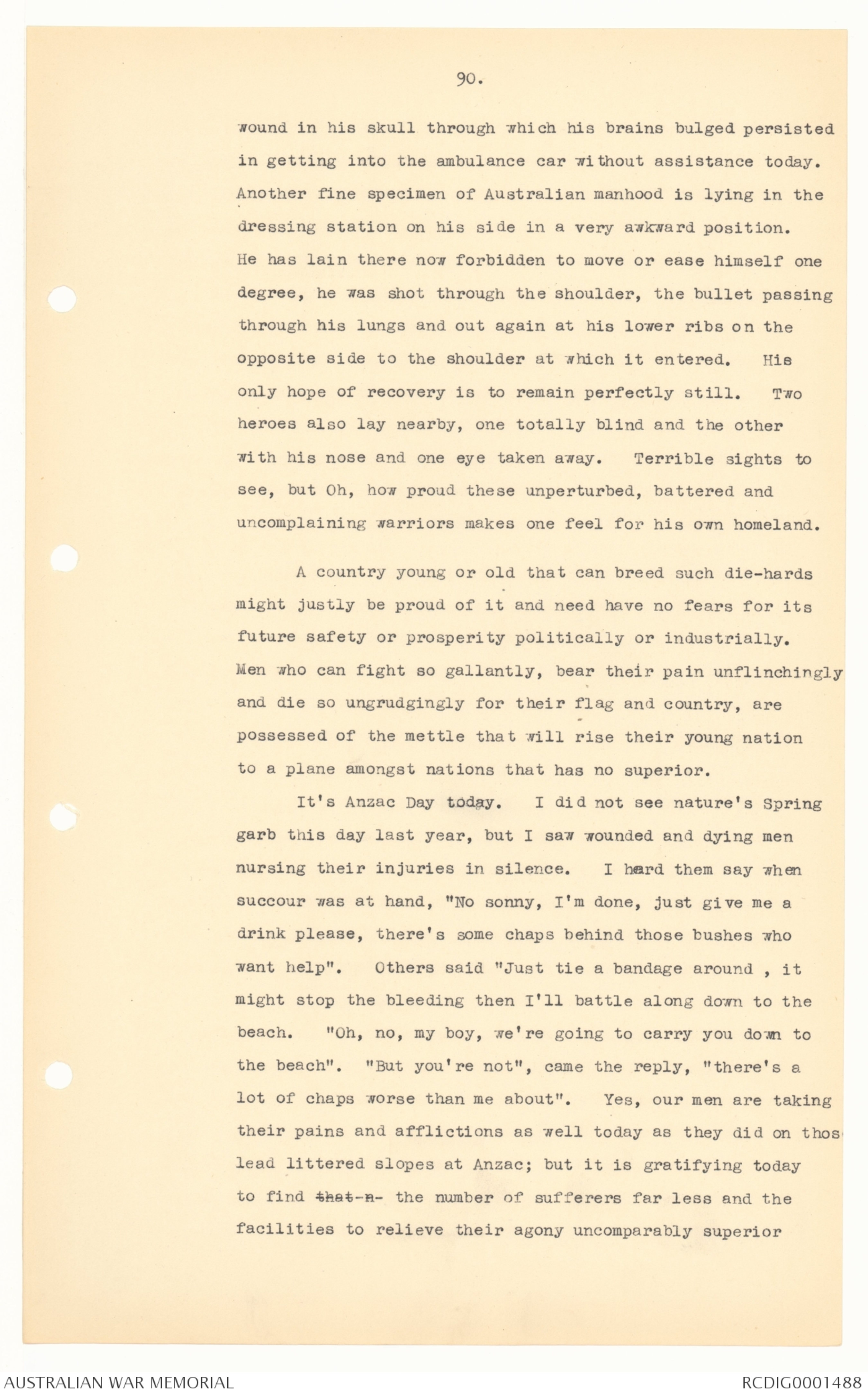
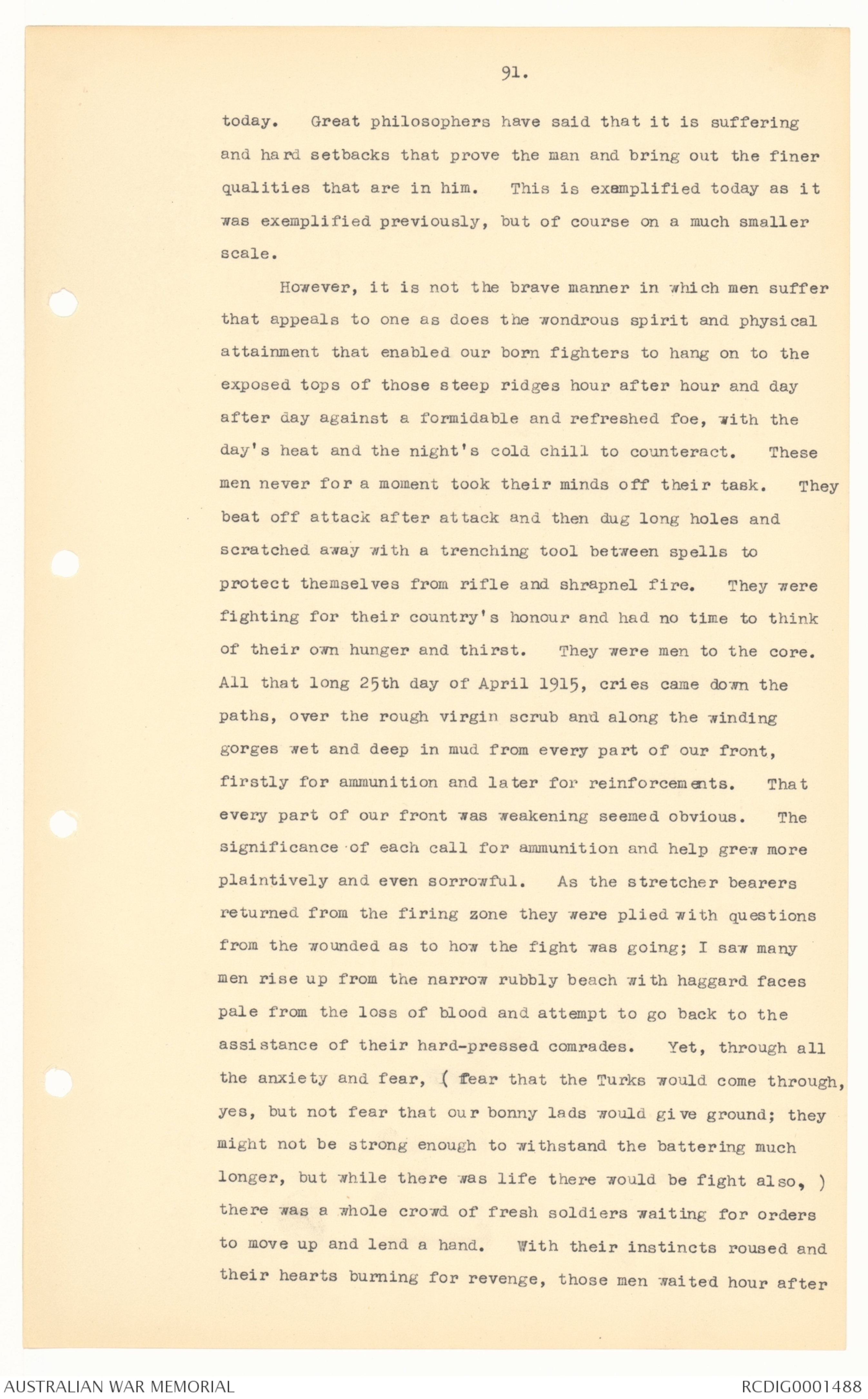
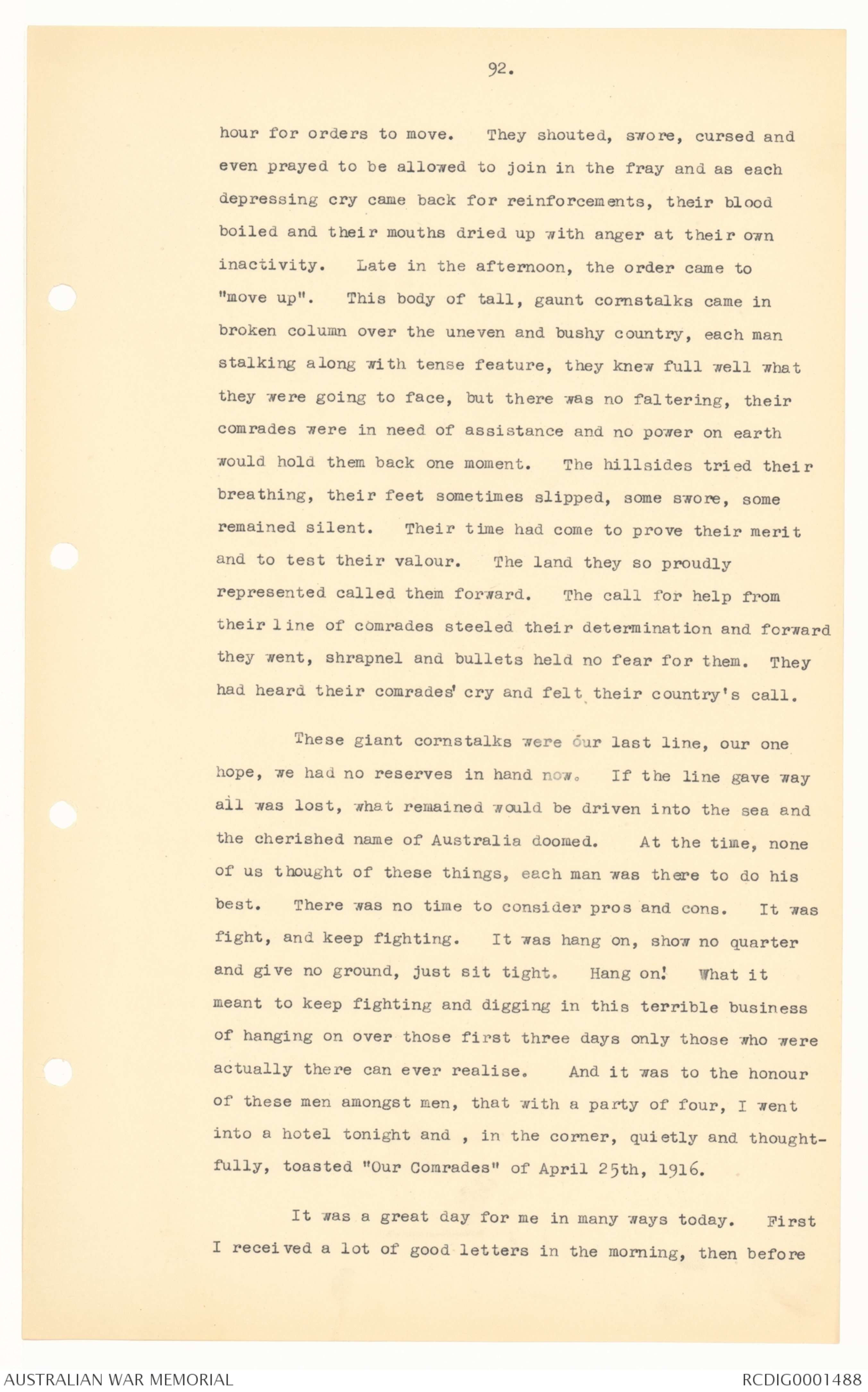
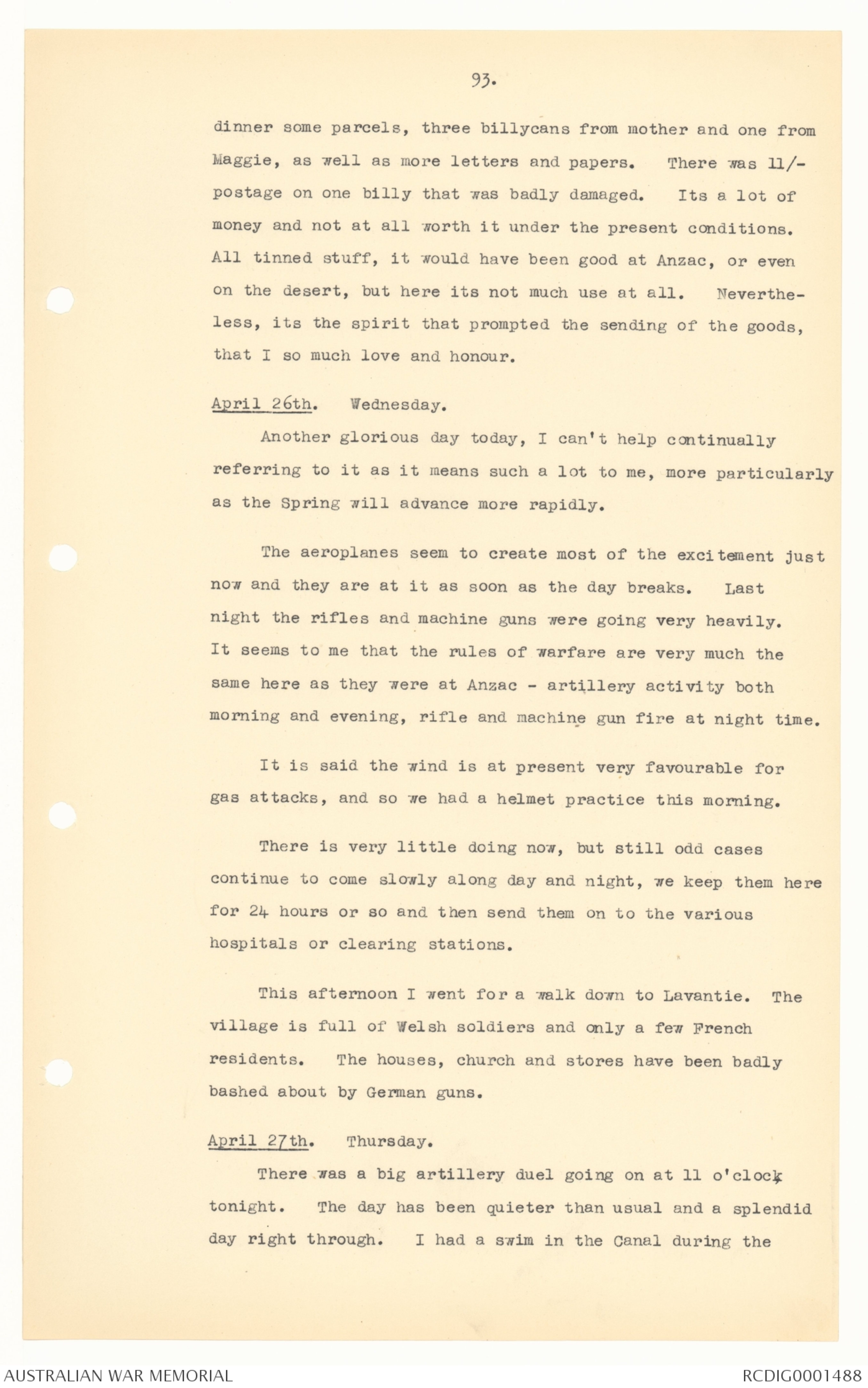
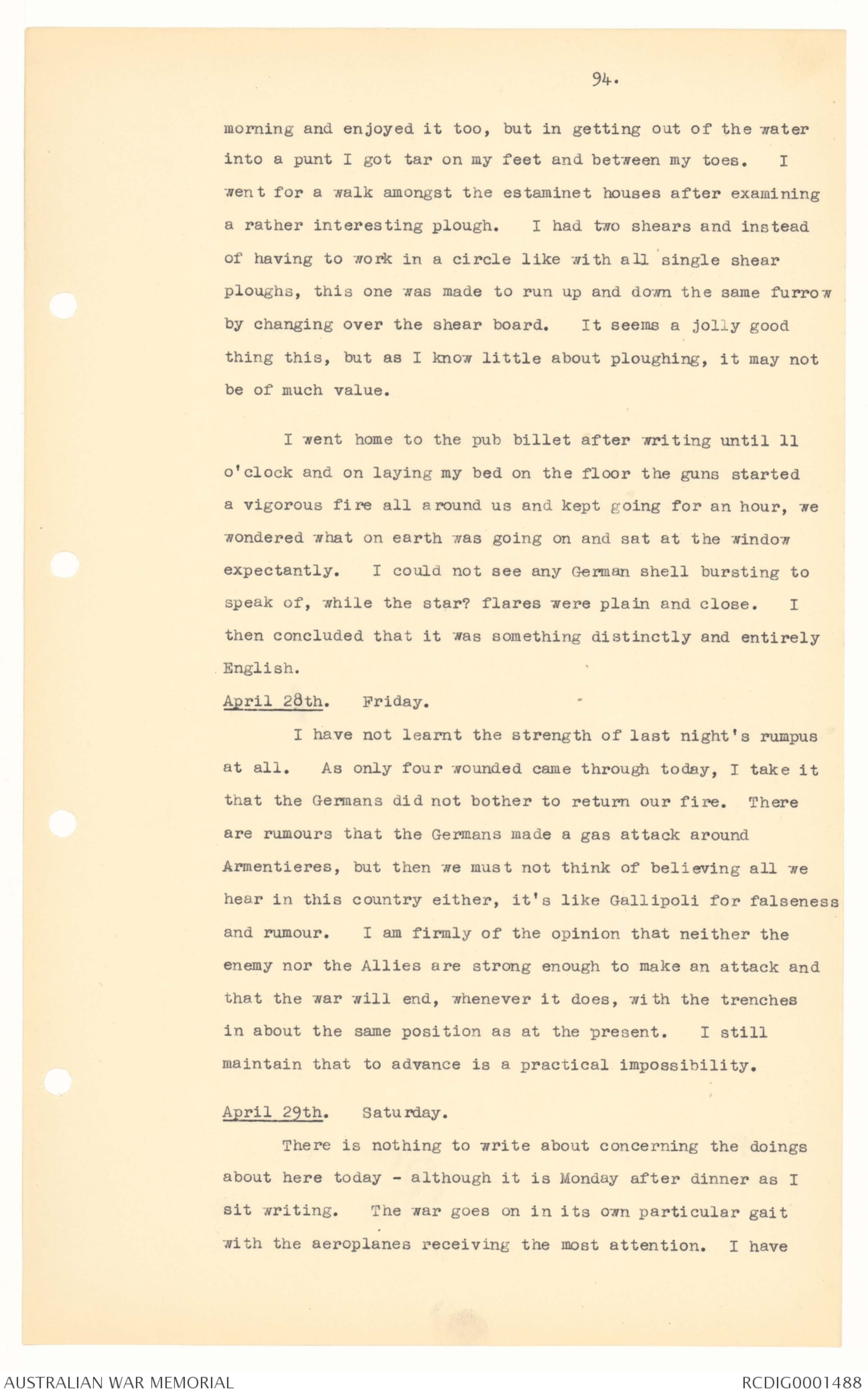
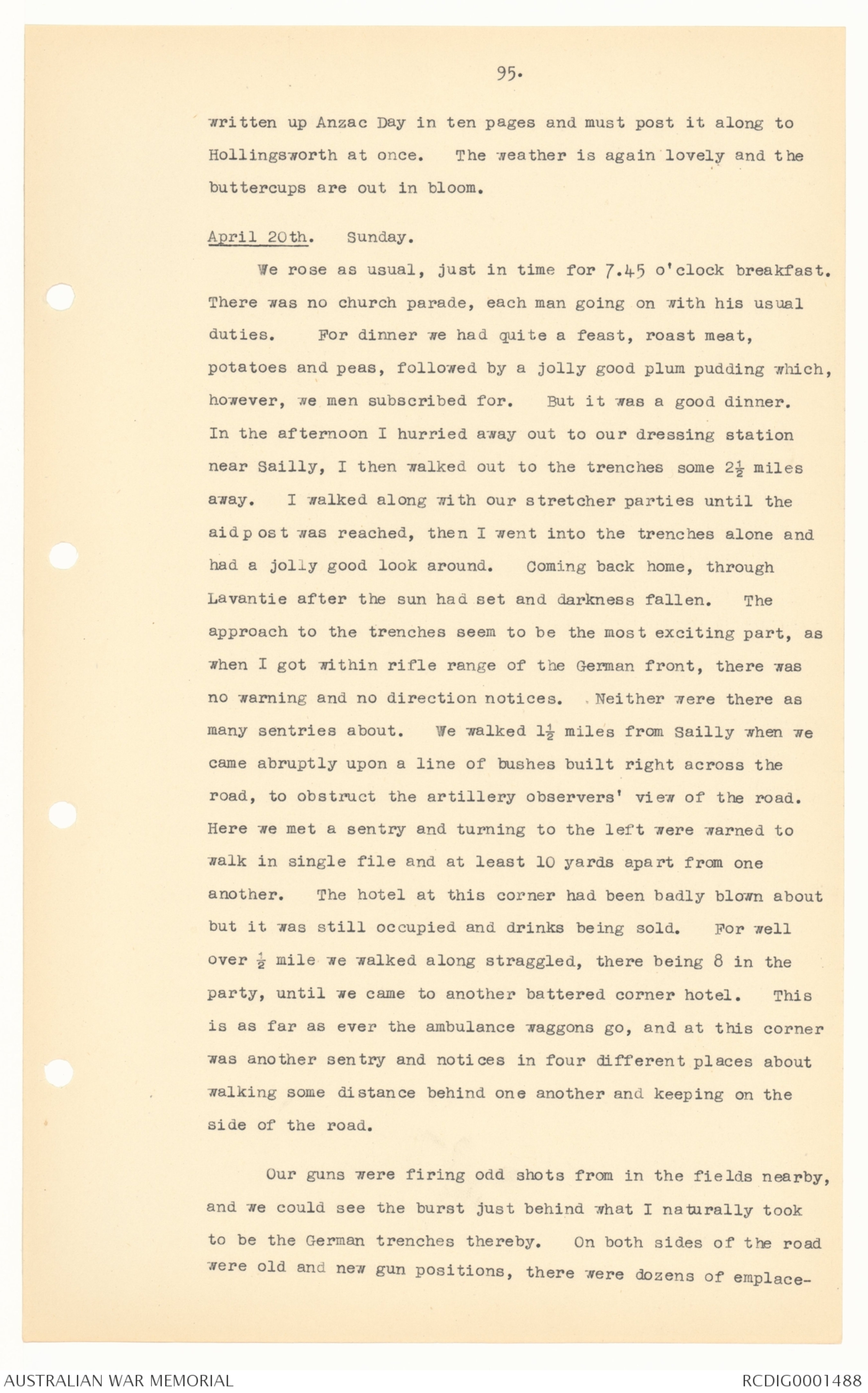
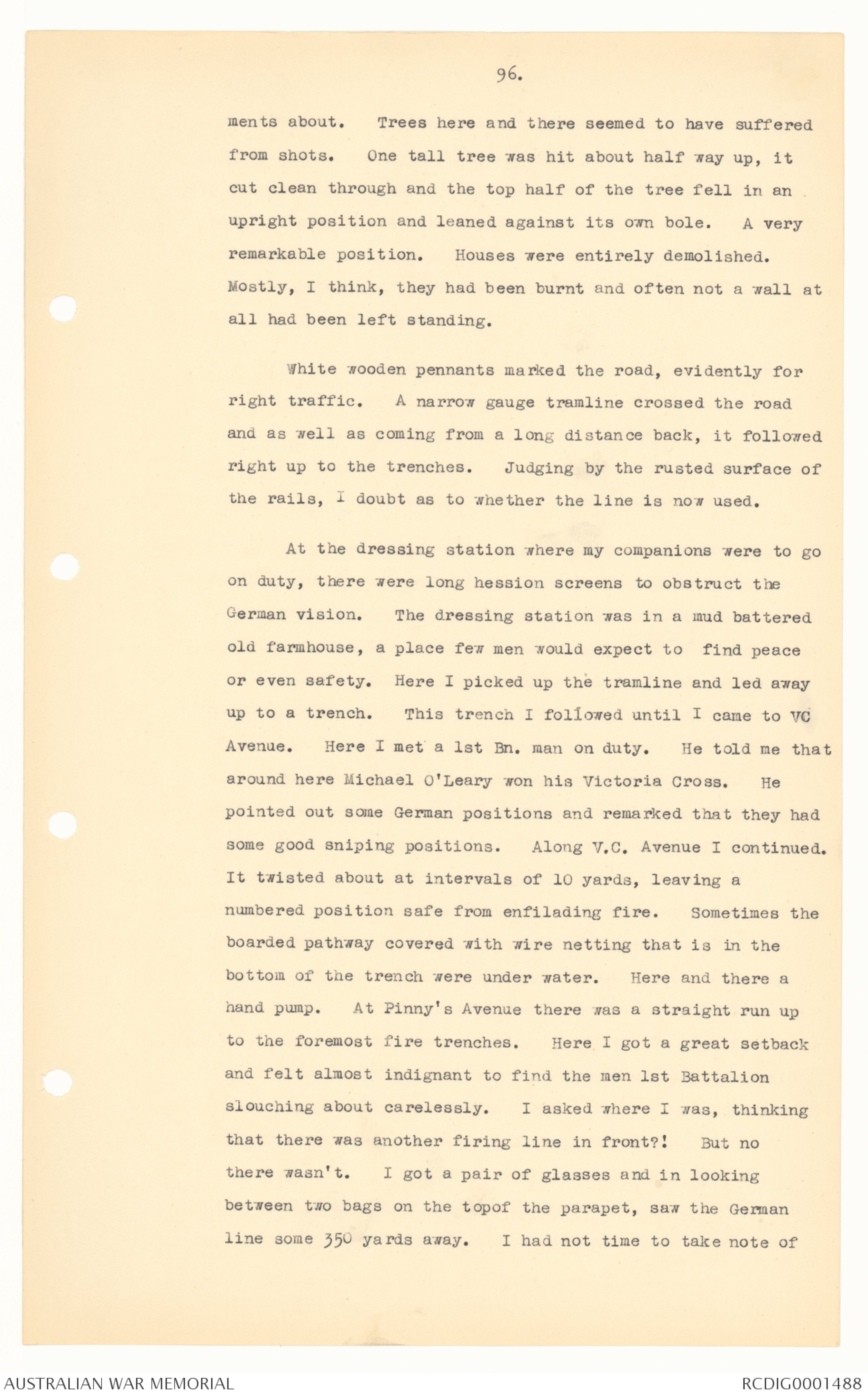
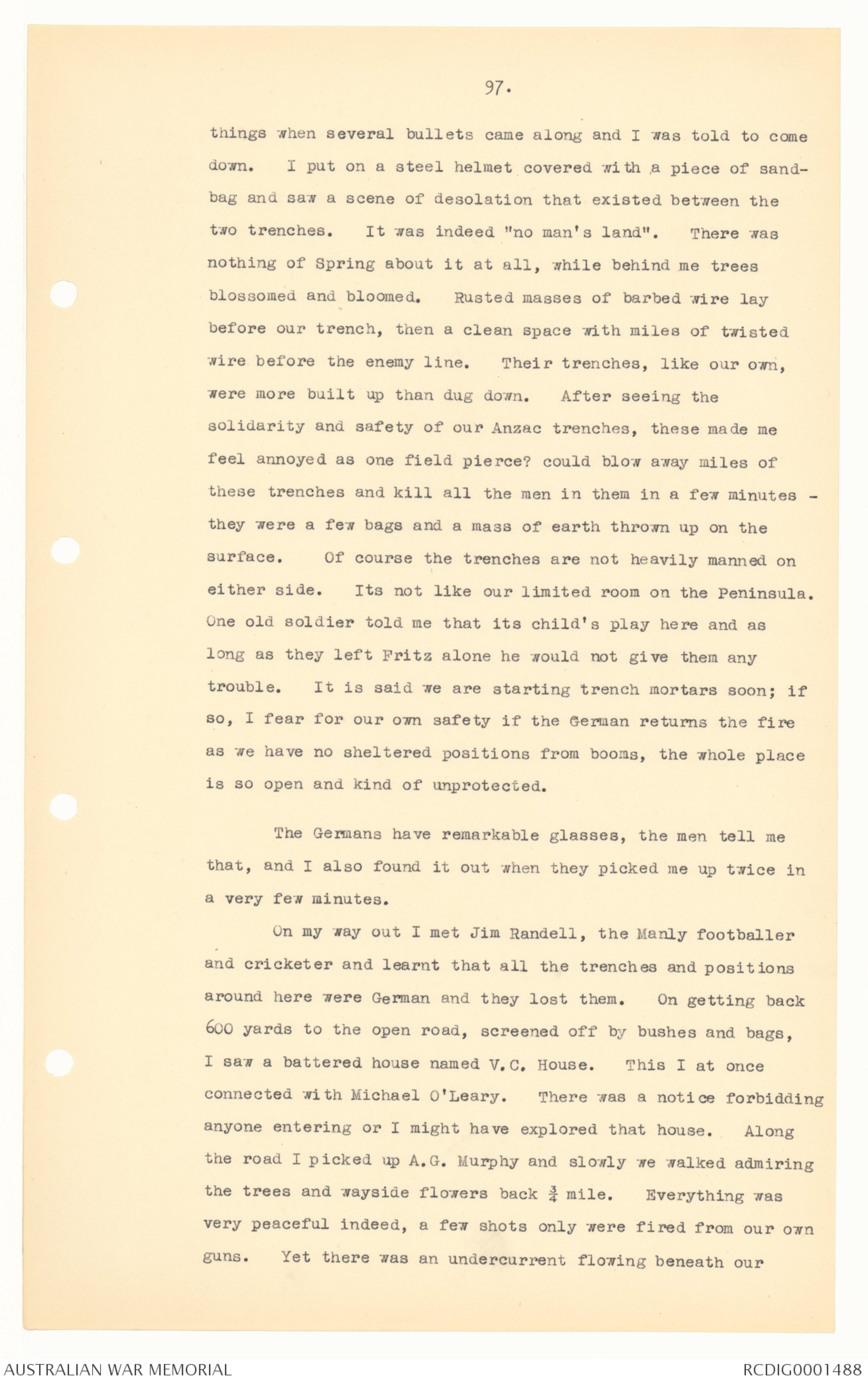
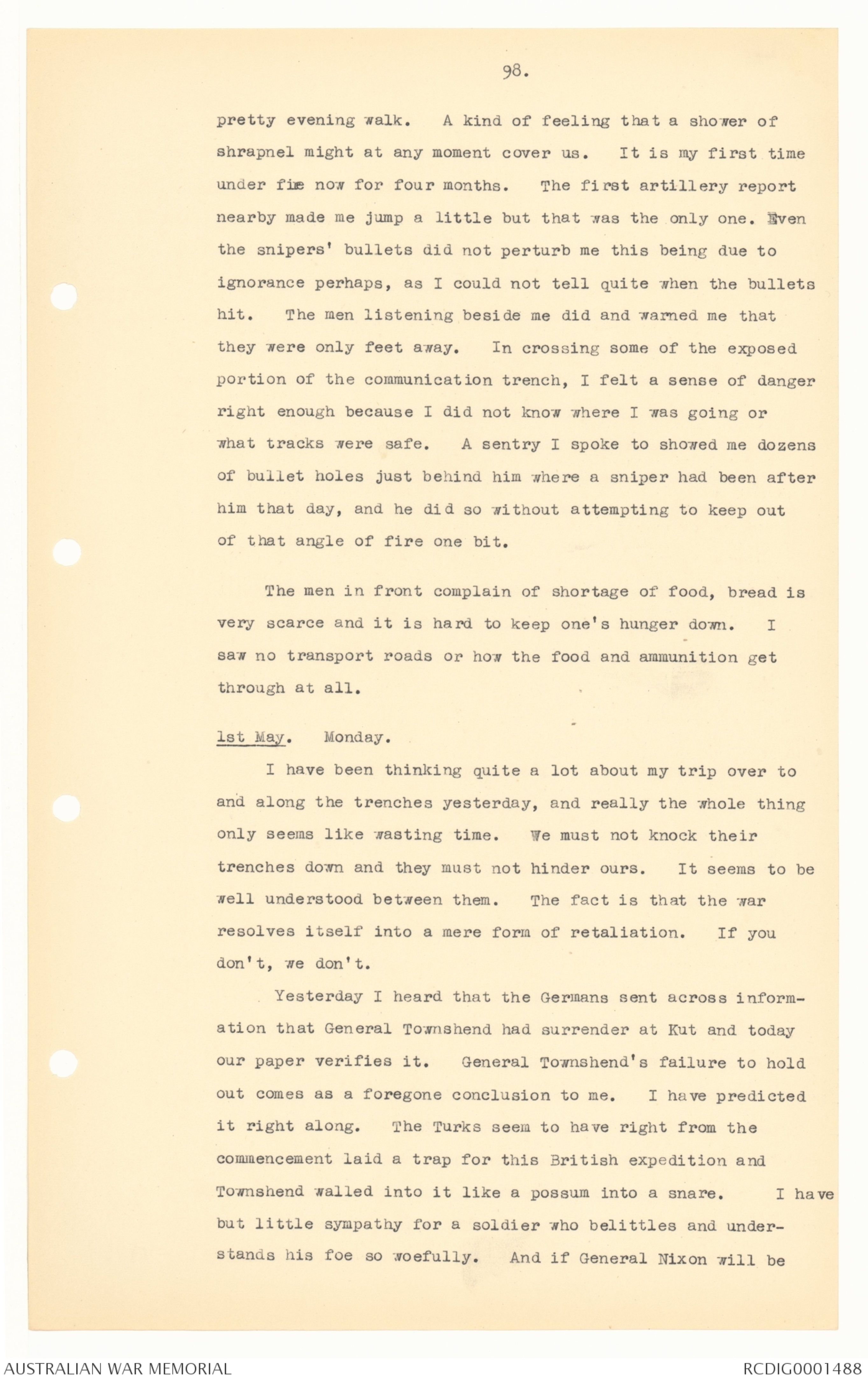
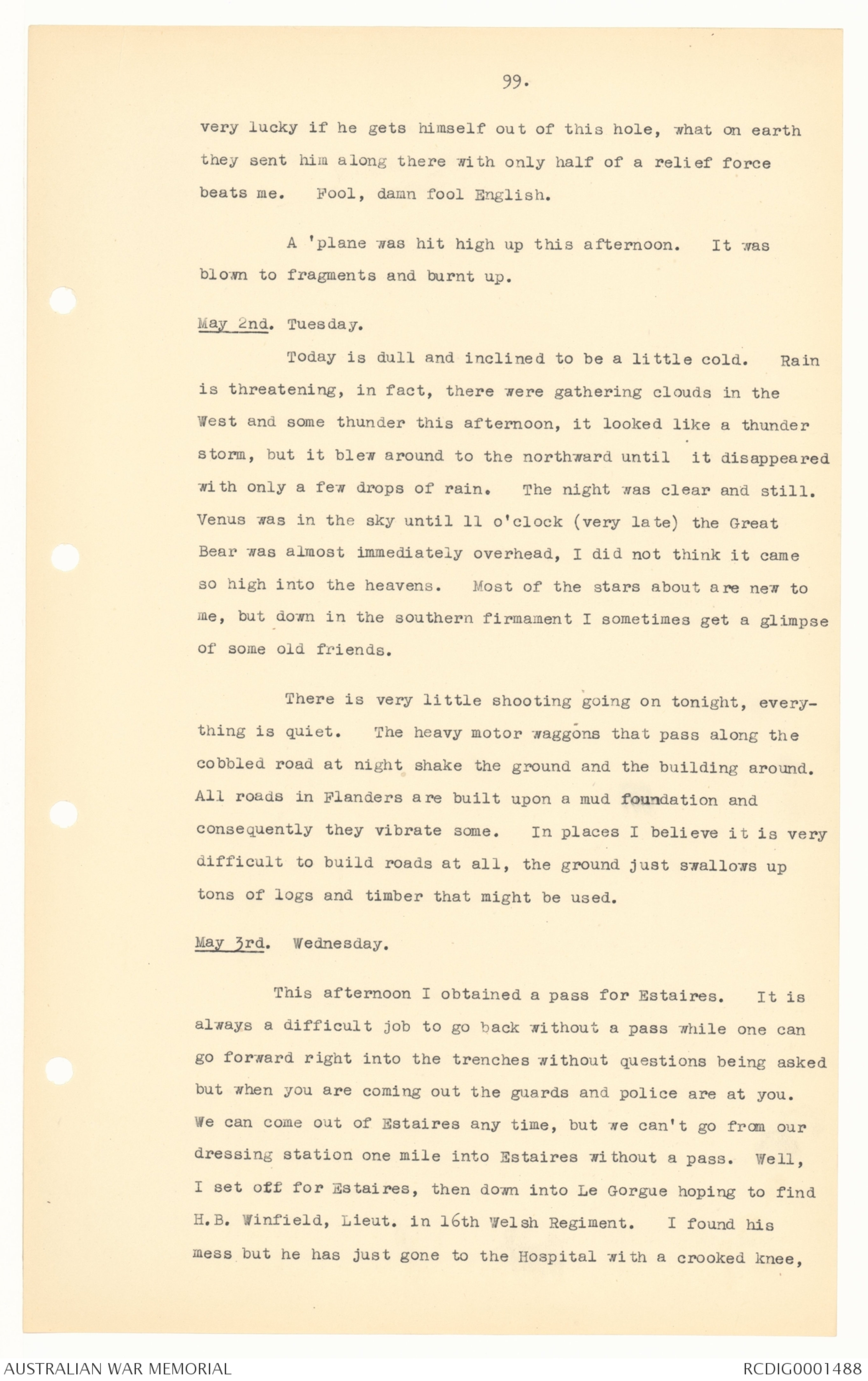
90.
wound in his skull through which his brains bulged persisted
in getting into the ambulance car without assistance today.
Another fine specimen of Australian manhood is lying in the
dressing station on his side in a very awkward position.
He has lain there now forbidden to move or ease himself one
degree, he was shot through the shoulder, the bullet passing
through his lungs and out again at his lower ribs on the
opposite side to the shoulder at which it entered. His
only hope of recovery is to remain perfectly still. Two
heroes also lay nearby, one totally blind and the other
with his nose and one eye taken away. Terrible sights to
see, but Oh, how proud these unperturbed, battered and
uncomplaining warriors makes one feel for his own homeland.
A country young or old that can breed such die-hards
might justly be proud of it and need have no fears for its
future safety or prosperity politically or industrially.
Men who can fight so gallantly, bear their pain unflinchingly
and die so ungrudgingly for their flag and country, are
possessed of the mettle that will rise their young nation
to a plane amongst nations that has no superior.
It's Anzac Day today. I did not see nature's Spring
garb this day last year, but I saw wounded and dying men
nursing their injuries in silence. I heard them say when
succour was at hand, "No sonny, I'm done, just give me a
drink please, there's some chaps behind those bushes who
want help". Others said "Just tie a bandage around, it
might stop the bleeding then I'll battle along down to the
beach. "Oh, no, my boy, we're going to carry you down to
the beach". "But you're not", came the reply, "there's a
lot of chaps worse than me about". Yes, our men are taking
their pains and afflictions as well today as they did on thos
lead littered slopes at Anzac; but it is gratifying today
to find that-- the number of sufferers far less and the
facilities to relieve their agony uncomparably superior
91.
today. Great philosophers have said that it is suffering
and hard setbacks that prove the man and bring out the finer
qualities that are in him. This is examplified today as it
was exemplified previously, but of course on a much smaller
scale.
However, it is not the brave manner in which men suffer
that appeals to one as does the wondrous spirit and physical
attainment that enabled our born fighters to hang on to the
exposed tops of those steep ridges hour after hour and day
after day against a formidable and refreshed foe, with the
day's heat and the night's cold chill to counteract. These
men never for a moment took their minds off their task. They
beat off attack after attack and then dug long holes and
scratched away with a trenching tool between spells to
protect themselves from rifle and shrapnel fire. They were
fighting for their country's honour and had no time to think
of their own hunger and thirst. They were men to the core.
All that long 25th day of April 1915, cries came down the
paths, over the rough virgin scrub and along the winding
gorges wet and deep in mud from every part of our front,
firstly for ammunition and later for reinforcements. That
every part of our front was weakening seemed obvious. The
significance of each call for ammunition and help grew more
plaintively and even sorrowful. As the stretcher bearers
returned from the firing zone they were plied with questions
from the wounded as to how the fight was going; I saw many
men rise up from the narrow rubbly beach with haggard faces
pale from the loss of blood and attempt to go back to the
assistance of their hard-pressed comrades. Yet, through all
the anxiety and fear, (fear that the Turks would come through,
yes, but not fear that our bonny lads would give ground; they
might not be strong enough to withstand the battering much
longer, but while there was life there would be fight also,
there was a whole crowd of fresh soldiers waiting for orders
to move up and lend a hand. with their instincts roused and
their hearts burning for revenge, those men waited hour after
92.
hour for orders to move.
They shouted, swore, cursed and
even prayed to be allowed to join in the fray and as each
depressing cry came back for reinforcements, their blood
boiled and their mouths dried up with anger at their own
inactivity. Late in the afternoon, the order came to
"move up". This body of tall, gaunt cornstalks came in
broken column over the uneven and bushy country, each man
stalking along with tense feature, they knew full well what
they were going to face, but there was no faltering, their
comrades were in need of assistance and no power on earth
would hold them back one moment. The hillsides tried their
breathing, their feet sometimes slipped, some swore, some
remained silent. Their time had come to prove their merit
and to test their valour. The land they so proudly
represented called them forward. The call for help from
their line of comrades steeled their determination and forward
they went, shrapnel and bullets held no fear for them. They
had heard their comrades cry and felt their country's call.
These giant cornstalks were our last line, our one
hope, we had no reserves in hand now. If the line gave way
all was lost, what remained would be driven into the sea and
the cherished name of Australia doomed. At the time, none
of us thought of these things, each man was there to do his
best. There was no time to consider pros and cons. It was
fight, and keep fighting. It was hang on, show no quarter
and give no ground, just sit tight. Hang on! What it
meant to keep fighting and digging in this terrible business
of hanging on over those first three days only those who were
actually there can ever realise. And it was to the honour
of these men amongst men, that with a party of four, I went
into a hotel tonight and, in the corner, quietly and thought-
fully, toasted "Our Comrades" of April 25th, 1916.
It was a great day for me in many ways today. First
I received a lot of good letters in the morning, then before
93.
dinner some parcels, three billycans from mother and one from
Maggie, as well as more letters and papers. There was 11/-
postage on one billy that was badly damaged. Its a lot of
money and not at all worth it under the present conditions.
All tinned stuff, it would have been good at Anzac, or even
on the desert, but here its not much use at all. Neverthe-
less, its the spirit that prompted the sending of the goods,
that I so much love and honour.
April 26. Wednesday.
Another glorious day today, I can't help continually
referring to it as it means such a lot to me, more particularly
as the Spring will advance more rapidly.
The aeroplanes seem to create most of the excitement just
now and they are at it as soon as the day breaks. Last
night the rifles and machine guns were going very heavily.
It seems to me that the rules of warfare are very much the
same here as they were at Anzac - artillery activity both
morning and evening, rifle and machine gun fire at night time.
It is said the wind is at present very favorable for
gas attacks, and so we had a helmet practice this morning.
There is very little doing now, but still odd cases
continue to come slowly along day and night, we keep them here
for 24 hours or so and then send them on to the various
hospitals or clearing stations.
This afternoon I went for a walk down to Lavantie. The
village is full of Welsh soldiers and only a few French
residents. The houses, church and stores have been badly
bashed about by German guns.
April 27th Thursday.
There was a big artillery duel going on at 11 o'clock
tonight. The day has been quieter than usual and a splendid
day right through. I had a swim in the Canal during the
94.
morning and enjoyed it too, but in getting out of the water
into a punt I got tar on my feet and between my toes. I
went for a walk amongst the estaminet houses after examining
a rather interesting plough. I had two shears and instead
of having to work in a circle like with all single shear
ploughs, this one was made to run up and down the same furrow
by changing over the shear board. It seems a jolly good
thing this, but as I know little about ploughing, it may not
be of much value.
I went home to the pub billet after writing until 11
o'clock and on laying my bed on the floor the guns started
a vigorous fire all around us and kept going for an hour, we
wondered what on earth was going on and sat at the window
expectantly. I could not see any German shell bursting to
speak of, while the star? flares were plain and close.
then concluded that it was something distinctly and entirely
English.
April 28th. Friday.
I have not learnt the strength of last night's rumpus
at all. As only four wounded came through today, I take it
that the Germans did not bother to return our fire. There
are rumours that the Germans made a gas attack around
Armentieres, but then we must not think of believing all we
hear in this country either, it's like Gallipoli for falseness
and rumour. I am firmly of the opinion that neither the
enemy nor the Allies are strong enough to make an attack and
that the war will end, whenever it does, with the trenches
in about the same position as at the present. I still
maintain that to advance is a practical impossibility.
April 29th. Saturday.
There is nothing to write about concerning the doings
about here today - although it is Monday after dinner as I
sit writing. The war goes on in its own particular gait
with the aeroplanes receiving the most attention. I have
95.
written up Anzac Day in ten pages and must post it along to
Hollingsworth at once. The weather is again lovely and the
buttercups are out in bloom.
April 30th. Sunday.
We rose as usual, just in time for 7.45 o'clock breakfast.
There was no church parade, each man going on with his usual
duties. For dinner we had quite a feast, roast meat,
potatoes and peas, followed by a jolly good plum pudding which,
however, we men subscribed for. But it was a good dinner.
In the afternoon I hurried away out to our dressing station
near Sailly, I then walked out to the trenches some 2 miles
away. I walked along with our stretcher parties until the
aidpost was reached, then I went into the trenches alone and
had a jolly good look around. Coming back home, through
Lavantie after the sun had set and darkness fallen. The
approach to the trenches seem to be the most exciting part, as
when I got within rifle range of the German front, there was
no warning and no direction notices. Neither were there as
many sentries about. We walked 1/2 miles from Sailly when we
came abruptly upon a line of bushes built right across the
road, to obstruct the artillery observers' view of the road.
Here we met a sentry and turning to the left were warned to
walk in single file and at least 10 yards apart from one
another. The hotel at this corner had been badly blown about
but it was still occupied and drinks being sold. For well
over mile we walked along straggled, there being 8 in the
party, until we came to another battered corner hotel. This
is as far as ever the ambulance waggons go, and at this corner
was another sentry and notices in four different places about
walking some distance behind one another and keeping on the
side of the road.
Our guns were firing odd shots from in the fields nearby,
and we could see the burst just behind what I naturally took
to be the German trenches thereby. On both sides of the road
were old and new gun positions, there were dozens of emplacements
96.
about. Trees here and there seemed to have suffered
from shots. One tall tree was hit about half way up, it
cut clean through and the top half of the tree fell in an
upright position and leaned against its own bole. A very
remarkable position. Houses were entirely demolished.
Mostly, I think, they had been burnt and often not a wall at
all had been left standing.
White wooden pennants marked the road, evidently for
right traffic. A narrow gauge tramline crossed the road
and as well as coming from a long distance back, it followed
right up to the trenches. Judging by the rusted surface of
the rails, I doubt as to whether the line is now used.
At the dressing station where my companions were to go
on duty, there were long hession screens to obstruct the
German vision. The dressing station was in a mud battered
old farmhouse, a place few men would expect to find peace
or even safety. Here I picked up the tramline and led away
up to a trench. This trench I followed until I came to VC
Avenue. Here I met a lst Bn. man on duty. He told me that
around here Michael O'Leary won his Victoria Cross. He
pointed out some German positions and remarked that they had
some good sniping positions. Along V.C. Avenue I continued.
It twisted about at intervals of 10 yards, leaving a
numbered position safe from enfilading fire. Sometimes the
boarded pathway covered with wire netting that is in the
bottom of the trench were under water. Here and there a
hand pump. At Pinny's Avenue there was a straight run up
to the foremost fire trenches. Here I got a great setback
and felt almost indignant to find the men lst Battalion
slouching about carelessly. I asked where I was, thinking
that there was another firing line in front?! But no
there wasn't. I got a pair of glasses and in looking
between two bags on the topof the parapet, saw the German
line some 350 yards away. I had not time to take note of
97.
things when several bullets came along and I was told to come
down. I put on a steel helmet covered with a piece of sand-
bag and saw a scene of desolation that existed between the
two trenches. It was indeed "no man's land".
There was nothing of Spring about it at all, while behind me trees
blossomed and bloomed. Rusted masses of barbed wire lay
before our trench, then a clean space with miles of twisted
wire before the enemy line. Their trenches, like our own,
were more built up than dug down. After seeing the
solidarity and safety of our Anzac trenches, these made me
feel annoyed as one field pierce? could blow away miles of
these trenches and kill all the men in them in a few minutes -
they were a few bags and a mass of earth thrown up on the
surface. Of course the trenches are not heavily manned on
either side. Its not like our limited room on the Peninsula.
One old soldier told me that its child's play here and as
long as they left Fritz alone he would not give them any
trouble. It is said we are starting trench mortars soon; if
so, I fear for our own safety if the German returns the fire
as we have no sheltered positions from booms, the whole place
is so open and kind of unprotected.
The Germans have remarkable glasses, the men tell me
that, and I also found it out when they picked me up twice in
a very few minutes.
On my way out I met Jim Randell, the Manly footballer
and cricketer and learnt that all the trenches and positions
around here were German and they lost them. On getting back
600 yards to the open road, screened off by bushes and bags,
I saw a battered house named V.C. House. This I at once
connected with Michael O'Leary. There was a notice forbidding
anyone entering or I might have explored that house. Along
the road I picked up A.G. Murphy and slowly we walked admiring
the trees and wayside flowers back mile. Everything was
very peaceful indeed, a few shots only were fired from our own
guns. Yet there was an undercurrent flowing beneath our
98.
pretty evening walk. A kind of feeling that a shower of
shrapnel might at any moment cover us. It is my first time
under fire now for four months. The first artillery report
nearby made me jump a little but that was the only one. Even
the snipers' bullets did not perturb me this being due to
ignorance perhaps, as I could not tell quite when the bullets
hit. The men listening beside me did and warned me that
they were only feet away. In crossing some of the exposed
portion of the communication trench, I felt a sense of danger
right enough because I did not know where I was going or
what tracks were safe. A sentry I spoke to showed me dozens
of bullet holes just behind him where a sniper had been after
him that day, and he did so without attempting to keep out
of that angle of fire one bit.
The men in front complain of shortage of food, bread is
very scarce and it is hard to keep one's hunger down. I
saw no transport roads or how the food and ammunition get
through at all.
1st May. Monday.
I have been thinking quite a lot about my trip over to
and along the trenches yesterday, and really the whole thing
only seems like wasting time. We must not knock their
trenches down and they must not hinder ours. It seems to be
well understood between them. The fact is that the war
resolves itself into a mere form of retaliation. If you
don't, we don't.
Yesterday I heard that the Germans sent across inform-
ation that General Townshend had surrender at Kut and today
our paper verifies it. General Townshend's failure to hold
out comes as a foregone conclusion to me. I have predicted
it right along. The Turks seem to have right from the
commencement laid a trap for this British expedition and
Townshend walled into it like a possum into a snare.
I have but little sympathy for a soldier who belittles and under-
stands his foe so woefully. And if General Nixon will be
99.
very lucky if he gets himself out of this hole, what on earth
they sent him along there with only half of a relief force
beats me. Fool, damn fool English.
A 'plane was hit high up this afternoon. It was
blown to fragments and burnt up.
May 2nd. Tuesday.
Today is dull and inclined to be a little cold. Rain
is threatening, in fact, there were gathering clouds in the
West and some thunder this afternoon, it looked like a thunder
storm, but it blew around to the northward until it disappeared
with only a few drops of rain. The night was clear and still.
Venus was in the sky until 11 o'clock (very late) the Great
Bear was almost immediately overhead, I did not think it came
so high into the heavens. Most of the stars about are nex to
me, but down in the southern firmament I sometimes get a glimpse
of some old friends.
There is very little shooting going on tonight, every-
thing is quiet. The heavy motor waggons that pass along the
cobbled road at night shake the ground and the building around.
All roads in Flanders are built upon a mud foundation and
consequently they vibrate some. In places I believe it is very
difficult to build roads at all, the ground just swallows up
tons of logs and timber that might be used.
May 3rd. Wednesday.
This afternoon I obtained a pass for Estaires. It is
always a difficult job to go back without a pass while one can
go forward right into the trenches without questions being asked
but when you are coming out the guards and police are at you.
We can come out of Estaires any time, but we can't go from our
dressing station one mile into Estaires without a pass. Well,
I set off for Estaires, then down into Le Gorgue hoping to find
H.B. Winfield, Lieut, in 16th Welsh Regiment. I found his
mess but he has just gone to the Hospital with a crooked knee,
This transcription item is now locked to you for editing. To release the lock either Save your changes or Cancel.
This lock will be automatically released after 60 minutes of inactivity.